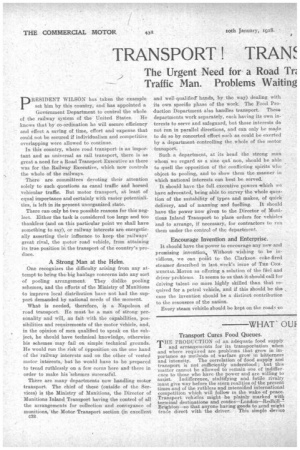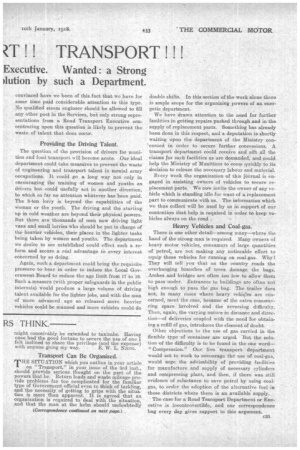TRANSPORT! TRAN", TRANSPORT!!!
Page 8

Page 9

If you've noticed an error in this article please click here to report it so we can fix it.
RESIDENT WILSON has taken the example set him by this country, and has appointed a Government Department to control the whole of the railway system of the United States. He knows that by co-ordination he will secure efficiency and effect a saving of time, effort and expense that could not be secured if individualism and competitive overlapping were allowed to continue.
In this country, where road transport is as important and as universal as rail transport, there is as great a need for a Road Transport Executive as there was for the Railway Executive, which now controls the whole of the railways.
There are committees devoting their attention solely to such questions as canal traffic and horsed vehicular traffic. But motor transport, at least of equal importance and certainly with vaster potentialities, is left in its present unorganized state.
There can only be two possible reasons for this neglect. Either the task is considered too large and too thankless (and on this particular point we shall have something to say), or railway interests are energetically asserting their influence to keep the railways' great rival, the motor road vehicle, from attaining its true position in the transport of the country's produce.
A Strong Man at the Helm.
One recognizes the difficulty arising from any attempt to bring the big haulage concerns into any sort of pooling arrangement. They dislike pooling schemes, and the efforts of the Ministry of Munitions to improve local distribution have not had the support demanded by national needs of the moment.
What is needed, therefore, in a Napoleon of road transport. He must be a man of strong personality and will, au fait with the capabilities, possibilities and requirements of the motor vehicle, and, in the opinion of men qualified to speak on the sub . ject, he should have technical knowledge, otherwise his schemes may fail on simple technical grounds. He would run the risk of opposition on. the one hand of the railway interests and on the other of vested motor interests, but he would have to be prepared to tread ruthlessly on a few corns here and there in order to make his -schemes successful.
There are many departments now handling motor transport The chief of these (outside of the Services) is the Ministry of Munitions, the Director of Munitions Inland Transport having the control of all the arrangements for collection and conveyance of munitions,'the Motor Transport section (in excellent and well-qualified hands, by. the way) dealing with its own specific phase of the work. The Food Production Department also handles transport. These departments work separately, each having its own in terests to serve and safeguard, but those interests do not run in parallel directions, and can only be made to do so by concerted effort such as could be exerted by a department controlling the whole of the motor transport.
Such a department, at its head the strong man whom we regard as a sine quA: non, should be able to quell the opposition of the conflicting spirits who object to pooling, and to show them the manner in which national interests can best be served.
It should have the full executive powers -which 'we have advocated, being able to survey the whole ques tion of the suitability of types and makes, of quick delivery, and of manning and fuelling. It should have the power now given to the Director of Muni tions Inland Transport to place orders for vehicles and to arrange, if necessary, for contractors to rim them under the control of the dePartme.nt.
Encourage Invention and Enterprise.
It should have the power to encourage any new and promising inventions Without wishing to be invidious, we can poilit to the Clarkson coke-fired steamer described in last week's isiue of Tux COMMERCIAL MOTOR a-s offering a solution of the fuel and driver problems. It seems to us that it should call for driving talent no more highly skilled than that reqUired for a petrol vehicle, and if this should be the case the invention should be a distinct contribution to the resources of the nation.
Every steam vehicle should be kept on the road.: -so convinced have we been of this fact that we have for some time paid considerable attention to this type. No qualified steam engineer should be allowed to fill any other post in the Services, but only strong representations from a Road Transport Executive concentrating upon this question is likely to prevent the waste of talent that does occur.
Providing the Driving Talent.
The question of the provision of drivers for munition and food transport will become acute. Our ideal department could take measures to prevent the waste of engineering and transport talent in menial army occupations. It could go a long way not only in encouraging the training of women and youths as drivers but could usefully act in another direction, to which so far no attention whatever has been paid. The 3-ton lorry is beyond the capabilities of the woman or the youth. The driving and the starting up in cold weather are beyond their physical powers. llut there are thousands of men now driving light vans and small lorries who should be put in charge of the heavier vehicles, their places in the lighter tasks being taken by women and youths. The department we desire to iee established could effect such a reform and secure a real advantage tO every interest concerned by so doing.
Again, such a department could bring the requisite pressure to bear in order to induce the Local Government Board to reduce the age limit from 17 to 16. Such a. measure (with proper safeguards in the public interests) would produce a large volume of driving talent available for the lighter jobs, and with the men of more advanced age so released more heavier vehicles could be manned and more vehicles could do double shifts. In this section of the work alone there is ample scope for the organizing powers of an energetic department.
We have drawn attention to the need for further facilities in getting repairs pushed through and in the supply of replacement parts. Something has already been done in this respect, and a deputation is shortly waiting upon the department of the. Ministry concerned in order to secure further concessions. A transport department could receive and sift all the claims for such fa.cilities as are demanded, and could help the Ministry of Munitions to come quickly to its decision to release the necessary labour and material.
Every week the organization of this journal is engaged in assisting owners of vehicles to secure replacement parts. We now invite the owner of any vehicle which is standing idle for want of a replacement part to communicate with us. The information which we thus collect will be used by us in support of our contention that help is required in order to keep vehicles always on the road.
Heavy Vehicles and Coal-gas."
There is one other detail—among many—where the hand of the strong man is required. Many owners of heavy motor vehicles, consumers of large quantities of petrol, are not making any noticeable effort to equip those vehicles for running on coal-gas. Why ? They will tell you that on the country roads the overhanging branches of trees damage the bags. Arches and bridges are often too low to allow them to pass under. Entrances to buildings are often not high enough to pass the gas bag. The trailer does not, in many cases where heavy vehicles are concerned, meet the case, because of the extra manceuvring space involved and the reversing difficulty. Then, again, the varying nature in distance and direction—of deliveries coupled with the need for obtaining a refill of gas, introduces the element of doubt.
Other objections to the use of gas carried in the flexible type of container are urged. But the solution of the difficulty is to be found in the one word-" Compression." Oue live transport department would set to work to encourage the use of coal-gas, would urge the advisability of providing facilities for manufacture and supply of necessary cylinders and compressing plant, and then, if there was still evidence of reluctance to save petrol by using coalgas, to prder the adoption of the alternative fuel in those districts where there is an available supply.
The case for a Road Transport Department or Executive is incontrovertible, and our correspondence bag every day gives support to this argument.
























